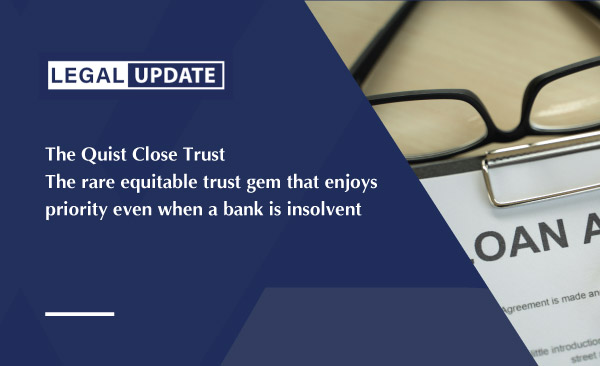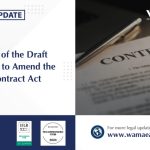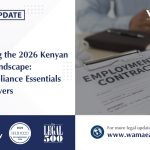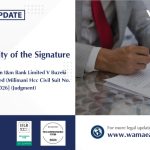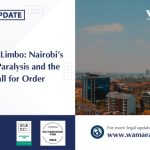BACKGROUND
The Plaintiff filed seeking payment and a declaration that the Defendants were liable to pay the sum of about USD 5 million as constructive trustees under the concept of the quistclose trust for failing to honor the payment of a Letter of Credit that was governed by the International Chamber of Commerce through the Uniform Customs and Practice Documentary Credits (UCP 600). Chase Bank (in Receivership) had previously admitted, prior to filing suit, that the payment made under the Letter of Credit did not constitute a general deposit and was intended to be honoured in full.
Chase Bank (in liquidation) opposed the claim and argued that the Plaintiff was a normal creditor who cannot seek preferential treatment over other ranking creditors under Section 50 of the Kenya Deposit Insurance Act.
COURT’S FINDINGS AND REASONING
In a detailed and concise exposition of the law, the court analysed whether the doctrines of equity can override express statutory provisions under the Kenya Deposit Insurance Act to imply the existence of a quistclose trust in favour of the Plaintiff.
The court considered the origin of the quistclose trust that was first addressed in Barclays Bank v Quistclose Investments, Ltd [1968] 3 All ER 651. In this case, money was lent to a company for specific purpose, viz, to pay a declared dividend. The loan was applicable only for such purpose and has to be repaid if not so applied. The bank had knowledge of the condition of loan. The company was wound up and bank applied to set off the money against the company’s indebtedness to the bank. The lender sought to recover money lent as being money subject to a trust for repayment and argued that the bank had notice making the trust binding on them. The bank lost the appeal and the court held that the respondents were entitled to recover the money from the appellants.
The court agreed that Article 10(2)(b) of the Constitution elevated the place of equity as a principle of justice that can supercede statutory provisions. The court followed the following cases that applied this principle:
- The Supreme Court as recently as 28th December 2023 in Petition No. 18 (E020) OF 2022 Arvind Shah & 7 Others v Mombasa Bricks & Tiles Limited & 5 Others asserted the supremacy of equity and declared that a constructive trust can be imported into a land sale agreement to defeat a registered title therefrom.
- The Court of Appeal in Willy Kimutai Kitilit v Michael Kibet, Civil Appeal No. 51 of 2015 [2018] eKLR, held that in matters involving the sale of land, the equitable doctrines of constructive trust and proprietary estoppel were applicable and enforceable to land, subject to the circumstances of the case.
The court when in great detail to analyse the applicability of constructive and resulting trusts and found that:
- When an insolvent bank goes into liquidation, that equitable charge secures for the beneficiaries and the trust priority over the claims of customers in respect of their deposits and over the claims of all other unsecured creditors. The priority is conferred because customers and other unsecured creditors voluntarily accept the risk of the bank’s insolvency, whereas the settler of the trust and the beneficiaries did not-per the Privy Council decision in Space Investments Ltd v Canadian Imperial Bank of Commerce Trust Co (Bahamas) Ltd, (1986) 1 WLR 1072.
- The property held in trust by an insolvent corporate entity is not treated as its assets.
- Section 106 of the Insolvency Act recognises that property held by the bankrupt in trust for another person vests in the bankruptcy trustee, who shall assume control of the property and deal with it for the benefit of the beneficiaries of the trust.
Comments
This was an exciting case for the firm based on the complexities of the case and successfully prosecuting the case after extensive research on the concept of quistclose trust.
The judgment affirms the elevation of equity as a constitutional pillar that dispenses substantive justice even in the face of oppressive statutory provisions that deprive a party of property.
The courts now apply the following equitable concepts:
- Equity shall suffer no wrong without a remedy.
- No man shall benefit from his wrongdoing.
- Equity detests unjust enrichment.
This article is provided free of charge for information purposes only; it does not constitute legal advice and should be relied on as such. No responsibility for the accuracy and/or correctness of the information and commentary as set in the article should be held without seeking specific legal advice on the subject matter. If you have any query regarding the same, please do not hesitate to contact Litigation Department at Litigation@wamaeallen.com
 Loading...
Loading...
About the author
Allen Waiyaki Gichuhi, our Senior Partner, is an experienced and widely respected litigator with over 20 years experience in complex commercial litigation. He is actively involved in legal industry reforms and is ranked in Dispute Resolution Band 2 by Chambers Global. Learn more
- Allen Waiyaki Gichuhi C.Arb SChttps://wamaeallen.com/author/allen/
- Allen Waiyaki Gichuhi C.Arb SChttps://wamaeallen.com/author/allen/
- Allen Waiyaki Gichuhi C.Arb SChttps://wamaeallen.com/author/allen/
- Allen Waiyaki Gichuhi C.Arb SChttps://wamaeallen.com/author/allen/

